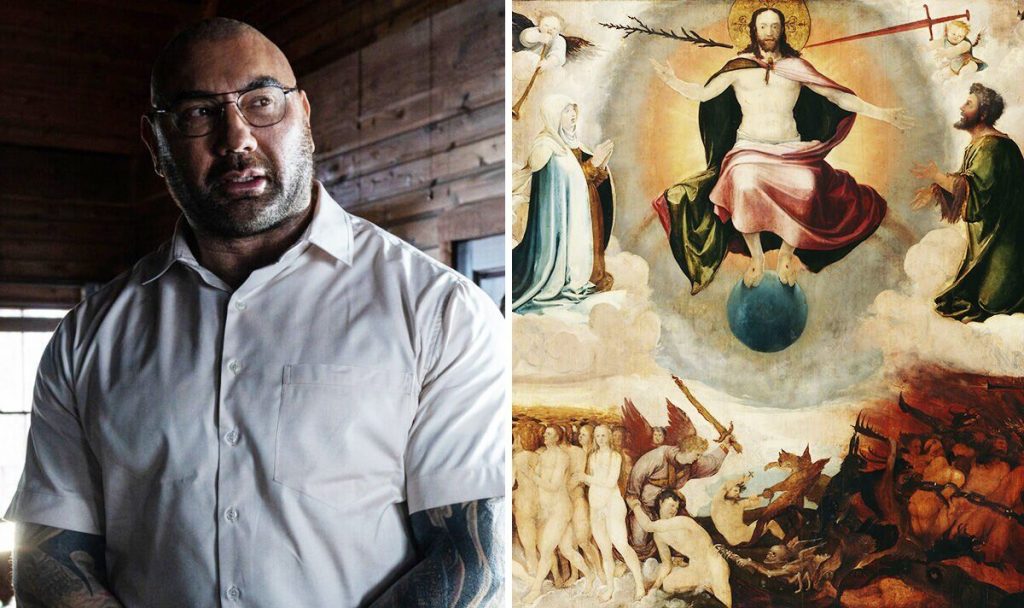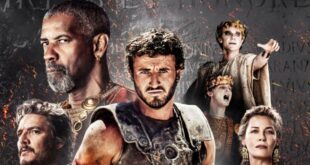
WARNING: SPOILERS FOR KNOCK AT THE CABIN AHEAD. Knock at the Cabin opens with four strangers arriving at a cabin in New Jersey where a gay couple and their adopted daughter are on holiday. Reluctantly forcing their way in, they tie up the family and claim to have had visions of the apocalypse before being led to each other and this cabin. To prevent the end of the world, one of the three family members must be a willing sacrifice who is killed by the other two. If not, everyone else will die and they will be the only people left alive. Here’s how The Bible’s prophecies about the end of the world in the Book of Revelation differ from what happens in M Night Shyamalan’s new movie.
The Four Horsemen of the Apocalypse and their Plagues
At the end of Knock at the Cabin, Eric realises that the four strangers, Leonard, Sabrina, Adriane and Redmond were the Four Horsemen of the Apocalypse. He noticed before they killed themselves, he witnessed them representing different virtues of humanity: penitence, nurturing, healing and guidance. Upon being killed by the other, each Horseman’s death ushered in a new plague. Redmond’s death brought about tsunamis, Adriane’s plagues, Sabrina’s plane crashes and Leonard’s would have brought the end of the world had Eric not been a willing sacrifice. The Four Horsemen also had strange weapons they claimed were tools that they’d forged in their visions and used in killing each other. Here’s how these details differ from The Bible’s Four Horsemen.
In The Bible’s Book of Revelation, the Apostle John has a vision in Chapter 6 in which The Lamb (Jesus) opens seven seals on a scroll, each of which usher in a judgement or apocalyptic event. Out of the first four come the Four Horsemen of the Apocalypse one at a time, each with a specific mission to one-fourth of the Earth.
The first comes out on a white horse with its rider holding a bow. He is given a crown and storms out as a conqueror bent on conquest. By tradition, he is called Pestilence, associated with infections diseases and plagues. Although some Christian theologians believe him to be Christ himself ahead of his appearance in Revelation 19 riding a white horse.
The second comes out on a fiery red horse with its rider being given a large sword and the power to take peace from the Earth and cause men to slay each other. By tradition, he is called War.
The third comes out on a black horse with its rider holding a pair of scales. By tradition, he is called Famine with the weighing instruments representing how bread would have been weighed during a famine.
The fourth comes out on a pale horse with its rider named Death. He is given authority to kill by the sword, famine, plague and wild beasts of the earth.
The Four Horsemen in Knock at the Cabin were more like prophets that ushered in plagues to force a reluctant decision, much like Moses demanding Pharoah free the Israelites from slavery in Exodus. In comparison, The Bible’s Four Horsemen are instruments of the carrying out of God’s final judgement, which takes place during Christ’s Second Coming at the end of the world.
The Sacrifice for Sin
Knock at the Cabin’s Four Horsemen claimed a sacrifice for humanity’s sin is needed to stop the end of the world and presumably placate God’s wrath. Eric realises at the end of the film that he, Andrew and Wen were chosen because of their pure love for each other. So in an act of pure love, the now serene Eric willingly agrees to be the sacrifice that saves the world. As a result, Andrew reluctantly kills his lover with a gun, which does indeed prevent the apocalypse.
In the Old Testament, God does require sacrifices for his people’s sins through the burnt offering of dead animals. However, he never requires them to sacrifice humans, something the pagan nations indulge in and God labels as a sin.
On one occasion in Genesis Chapter 22, God tests Abraham by telling him to sacrifice his son Isaac on Mount Moriah as a burnt offering. This is incredibly chilling for the prophet since Isaac was the child of promise out of who the nation of Israel would be born. Yet he trusts God, knowing that he can raise his son from the dead. Just before he sacrifices Isaac, the angel of the Lord appears demanding he not harm the boy. Instead, God provides a ram to be sacrificed as a burnt offering and substitute.
Flash forward to the New Testament and there is one human who is a sacrifice for sin, Jesus Christ. In The Bible, the Son of God is a willing sacrifice just as Eric is required to be in Knock at the Cabin. The difference is, Christians believe Jesus to be God come into the world in human form. He tells the disciples his mission is that he must die and rise again after three days. Jesus is then executed on a Roman cross as a sacrifice for sin, an act he goes to of his own accord.
So unlike Knock at the Cabin’s God who requires a human sacrifice, the God of the Bible becomes that sacrifice himself in an act of pure love to save humanity. The Book of Revelation predicts the Second Coming of Christ when he gathers his “sheep”, those who have accepted his sacrifice atoned for their sin, and separate them from “the goats” those who did not repent and remain under God’s judgement.
The End of the World
Knock at the Cabin’s apocalypse prevents the end of the world with a willing human sacrifice. In comparison, The Bible claims its apocalypse is certain and could happen at any time as a result of Christ’s death and resurrection making him the King of Kings who conquered sin and death.
The Book of Revelation concludes with the dead being raised and judged by God. Those whose names were not found in the Book of the Life were “thrown into the lake of fire” alongside The Devil, to be “tormented day and night forever and ever”. Those who were found in the Book of Life were rewarded with eternal life in a New Jerusalem. This is a city formed on a new heaven and new earth where there’s “no more death or mourning or crying or pain”.
Knock at the Cabin is out now in cinemas.

 Latest Breaking News Online News Portal
Latest Breaking News Online News Portal




